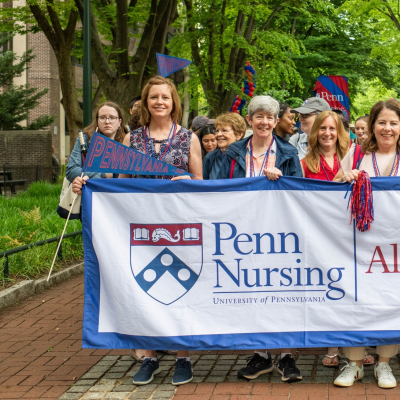Penn Nursing & Columbia School of Social Work Team Up to Educate Social Workers & Nurses about Psychedelic-Assisted Therapy
Thanks to a $1 million grant from the Joe & Sandy Samberg Foundation and the Steven & Alexandra Cohen Foundation, the University of Pennsylvania School of Nursing (Penn Nursing) and the Columbia University School of Social Work (CSSW) are developing a collaborative initiative to educate social workers and nurses about psychedelic-assisted therapy in anticipation of FDA approval of this type of treatment. This effort will help improve access to affordable, safe treatment facilitated by a large workforce of highly qualified practitioners.
September 07, 2022

The grants will fund the development of an educational training curriculum which will be piloted at Penn Nursing and CSSW with plans to expand to Columbia School of Nursing and Penn’s School of Social Policy & Practice (SP2). In addition to offering the curriculum to enrolled students, there are plans for curriculum targeting post-graduate nurses and social workers. Upon successful implementation, the intent is to have the curricula available at no cost for wider adoption to other institutions.
“This dynamic new partnership with Columbia University builds on Penn Nursing’s well-received Psychedelic Revival learning series held last year that brought the growing field of psychedelic medicine in mental health to a broad audience of nurses and nurse-scientists,” said Penn Nursing Dean Antonia M. Villarruel. “With Penn Nursing’s sharp focus on health equity and innovation, we are excited to work with Columbia University as well as with our colleagues here at SP2, to prepare our graduates to play key roles in psychedelic therapy provision—and ensure that barriers to this care are addressed.”
“We are facing a mental health care crisis in this country and beyond, and nurses and social workers are uniquely positioned not just to provide care but to disrupt the structural inequities in care that exist, through the use of impactful interventions such as psychedelic medicine,” said SP2 Dean Sara S. Bachman.
The curriculum at Penn Nursing and CSSW will offer associated practicums in psychedelic research, ketamine clinics, and clinical settings as psychedelic therapies are approved by the FDA. There are currently several randomized clinical trials consistent with the US Food and Drug Administration registration processes and have been granted fast-track status for their demonstrated efficacy across a range of mental health conditions, including depression, anxiety, post-traumatic stress disorder (PTSD), substance use disorders, end-of-life distress, obsessive-compulsive disorder, and eating disorders.
“Persons facing life-threatening illnesses and those at the end-of-life have highly burdensome physical symptoms, clinically significant levels of anxiety and depression, and existential distress due to loss of hope, purpose, and meaning,” said Salimah Meghani, PhD, MBE, RN, FAAN, Professor of Nursing & Term Chair of Palliative Care in the Department of Biobehavioral Health Sciences. “Many studies have shown that psychedelic therapies produce significant, meaningful, and lasting reductions in these forms of suffering.”
“Psychedelic-assisted therapy is a promising new treatment for debilitating mental health conditions, but safely providing it to patients requires specialized training” said Alexandra Cohen, President, Steven & Alexandra Cohen Foundation. “We are pleased to support these new training programs for social workers and nurses, so they are well-equipped to provide safe and accessible psychedelic-assisted therapy.”
Building from best practices developed by leaders in psychedelic-assisted therapy and research, the long-term goal of the project is to help meet future demand for psychedelic therapies with a highly trained, accessible, affordable, and diverse workforce. Sandy Samberg, RN, CPNP, Penn Nursing Alumna and Joe & Sandy Samberg Foundation Director said, “Social workers and nurses are two of the largest and most diverse healthcare providers in the U.S. With their complementary skill sets, they are uniquely positioned to work collaboratively and will help minimize the anticipated bottleneck of trained practitioners.”
The use of psychedelics in mental health care has recently garnered more media attention, most notably with the release of Michael Pollan’s 2018 book, How to Change Your Mind (Penguin Random House), and the 2022 Netflix documentary of the same name. As this new paradigm for mental health treatment comes to market, there is significant excitement about the potential to reduce suffering and improve quality of life for millions of people.








